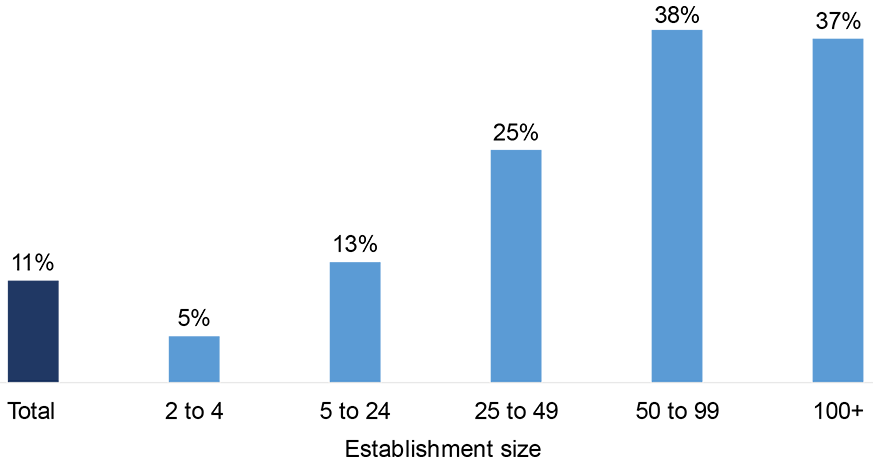UK Employer Skills Survey 2022 – Scotland Report
Publication of Scotland results from the UK Employer Skills Survey 2022.
Developing the Young Workforce (DYW)
Developing the Young Workforce (DYW) is the Scottish Government’s youth employment strategy, which aims to prepare young people for the world of work. DYW aims to provide more young people with a labour market-relevant range of work-based learning opportunities, vocational qualifications, and a broader range of post-education employment opportunities – a key way this is pursued is by fostering partnerships between local industry and employers, and education providers. Twenty-one employer-led DYW Regional Groups were established to help develop employer-education partnerships, as set out by the Scottish Government in 2014.
Work placements at school
10% of employers in Scotland provided work placements for young people in school over the last 12 months.
This is a similar proportion to 2021, when 8% provided placements for school students, but is a decrease from 2019 (20%). In 2022, placements for school pupils were more common than average among local or central government funded employers (35% compared to 19% of charity or voluntary sector establishments and 8% in the private sector) and specifically those in the Education sector (35%). Providing placements to school students was less common among smaller establishments; for example 7% of those with 2 to 4 employees had done so, compared with around three in ten (29%) establishments with 50 to 99 employees and around a quarter (27%) of those with 100 or more employees. By ROA region, those in the West (20%) and Glasgow (15%) ROA regions were most likely to have provided placements to school students.
Among employers providing placements for people at school, the average number taken on was 2 school students per establishment, in line with the 2021 average of 2 placements per establishment. In 2022, around four in ten (42%) employers took on one school pupil on a placement, while almost three in ten (28%) had two such placements.
About a fifth (21%) of employers offering placements for people at school recruited anyone into a permanent or long-term paid role either at the end of the placement or after they finished the rest of their studies, again similar to the 2021 proportion (22%).
Work inspiration activities
11% of employers in Scotland engaged with educational institutions in order to provide work inspiration activities in the last 12 months.
Work inspiration activities may include activities such as hosting site visits for students, talking to students about careers, or conducting activities such as mock interviews to improve the employability of students. These activities are provided to people at schools, colleges and universities. Employers were more likely to offer these activities in 2022 (11%) than in 2021 (8%), though still less likely than in 2019 (15%).
Work inspiration activities were less common among small employers; 5% of establishments with 2 to 4 employees had engaged with educational institutions to offer them. In contrast, establishments with 50 to 99 employees were most likely to engage in this activity (38%), as shown in Figure 11.
Work inspiration activities were less common among smaller employers

Base: All establishments in Scotland (Module C): Total (1,332); 2 to 4 (380); 5 to 24 (602); 25 to 49 (172); 50 to 99 (95); 100 or more (83).
As with school placements, local or central government funded employers were more likely to offer work inspiration activities (47%), compared with 23% of charity or voluntary sector establishments and 8% of private sector establishments. Employers in the Education (34%) and Health and Social Work (25%) sectors were most likely to offer work inspiration activities.
By ROA region, employers in Ayrshire (20%), Glasgow (16%) and Edinburgh and Lothians (16%) were most likely to offer them.
DYW Regional Groups
27% of employers in Scotland were aware of their local DYW Regional Group and 7% engaged with them in the last 12 months (25% of those aware had done so).
The 27% result represents an increase since 2021, when 15% had heard of the DYW Regional Groups. Engagement with the Regional Groups has also increased from 2% in 2021 to 7% in 2022.
Employers with over 100 staff are more likely to have heard of and engaged with DYW Regional Groups

Base: All establishments in Scotland (Module D): Total (1,213); 2 to 4 (339); 5 to 24 (596); 25 to 49 (157); 50 to 99 (71); 100 or more (50).
As shown in Figure 12, larger employers with over 100 staff were more likely to be aware of and to have engaged with the DYW Regional Groups (47% and 31% respectively).
By sector, Education establishments were also most likely to have heard of (44%) and to have engaged with (24%) the DYW Regional Groups. Manufacturing establishments, despite being more likely to have heard about DYW (41%), were no more likely to have engaged than average (7%).
Contact
Email: FHEstatistics@gov.scot
There is a problem
Thanks for your feedback